Partnership between New World Hotels & Resorts and Sun Group will unveil all-villa enclave at one of Vietnam’s finest beach destinations
Things to do in Mui Ne
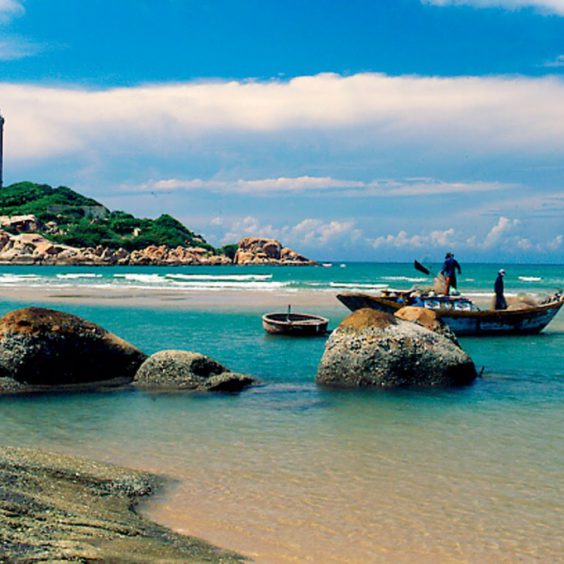
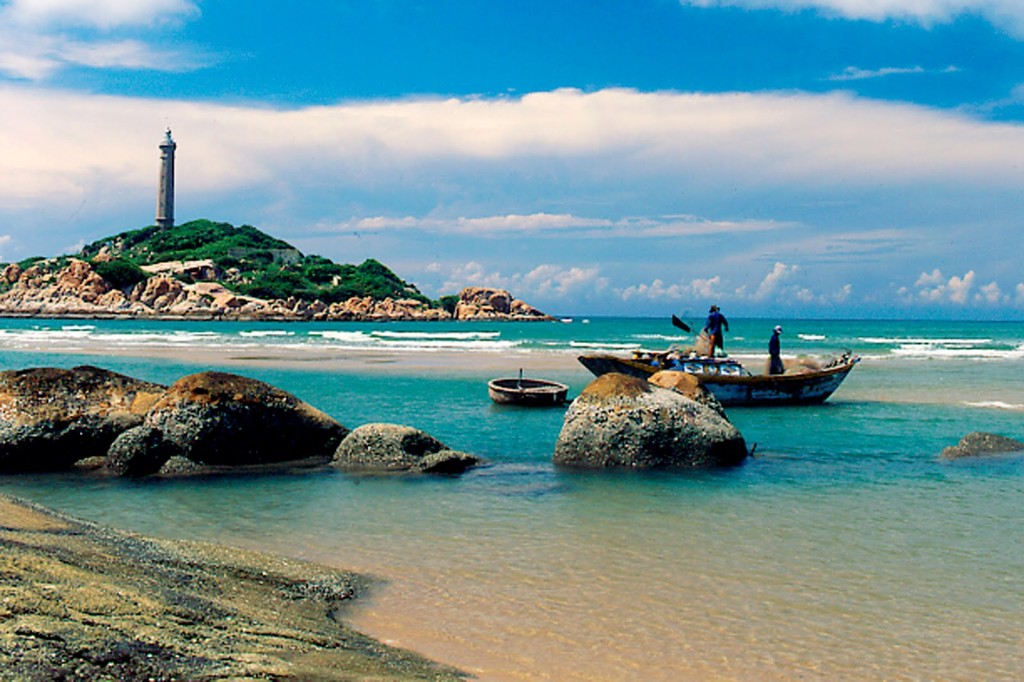
Many tourists arrive to Mui Ne without a clue of what the town is about. Most arrive on a southern Vietnam tour or as a stop-off on the tourist bus route running between Ho Chi Minh City and Hanoi, stepping out of their vehicle with wide eyes and big ambitions for what is usually the first stop from Saigon. It’s easy to miss some of the best things to do in Mui Ne if arriving this way, as a great deal of your itinerary is often planned for you, leading you to soak up the grand, sweeping natural beauty of the town but missing some of the quiet and unique additions to one of Vietnam’s best beach resorts. The meteoric rise in the 1990s of the laidback fishing town to this highly-regarded position has seen the glazing over of some of its satellite attractions, meaning many go ignored by visitors keen to settle on the beach and refuse to budge for three days. This is also a fine Mui Ne activity, but if there’s any chance of you getting a little bored after three days of sun-tanning, take solace in the fact that the other highlights of Mui Ne can be explored within relatively close proximity to the beach. These are top things to do in Mui Ne:
Natural Attractions
Mui Ne is all about natural beauty and it has the span of a south, east and west-facing coastline with which to display it proudly. 15km of this coastline is taken up by white-sand, earning Mui Ne one of the accolades for top beach destinations in Vietnam, but many of its natural attractions lie further inland, covering everything from the beautiful to the bizarre.
The Beaches
It’s not a surprise that staking a spot of white sand under the shade of a swaying palm tree, setting up shop and relaxing for the duration of the day is one of the more popular things to do in Mui Ne. Mui Ne is blessed with some great beaches, and if you know where to go, your Vietnam beach holiday can be spent in the utmost paradise.
The eponymous Mui Ne Beach is the town’s most popular, but not its best. The soft sands here still provide a comfortable seating platform to watch the windsurfers do their thing, but the beach’s ease of access is its undoing, flooding the coast with tourists and resorts claiming individual spits of sand.
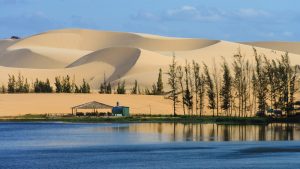
For true beach relaxation, it is worth making the effort to Mui Ne’s northeast coast where Suoi Nuoc (also called Long Son) lies in a straight line facing out onto the sea. Watching the sunrise from this east-facing beach certainly constitutes one of the top attractions in Mui Ne, and one not oversaturated with the same levels of tourists that Mui Ne Beach hosts.
Red and White Sand Dunes
Mui Ne might be one of the last places you expect to find two distinct deserts, but the popularity of these beautiful sand dunes speaks volumes. Occupying a position just off the main road, these inexplicable sand dunes look like a con at first. If you’ve heard of sand being imported to create some of the other of Vietnam’s best attractions, like Titop Island or Tuan Chau Harbour in Halong Bay, then you might think the same has been done here. In fact, the strong winds of Mui Ne are the reason these dunes exist, blowing sand around the cape where it settles in huge quantities.
As the most conveniently accessible, the Red Sand Dunes are the most popular, with orangey-red sand that shines vividly under the Mui Ne sun. Like with most desserts, there isn’t much to do but admire the beauty, which is magnified during the magnificent daily sunset, turning the orange dunes into a gorgeous blood-red. The dunes are situated about 500m from the coastline and 20 minutes from the main town, so they receive a great deal of tourist interest.

The most interesting thing to do in Mui Ne’s sand dunes is pretty much its only one; sand-sledding down the hills on what can loosely be described as a sled, but can much more accurately be described as a paper-thin piece of plastic with a string threaded through the top. They’re a cheap way of enjoying one of Vietnam’s best beach resorts, but most importantly, a great way of stopping children trying to push their homemade boards on you. Safety concerns about the boards are minimal, considering that they travel at about the same speed as a particularly languid camel, so give them a go, it might be a great introduction to the other adrenaline sporting activities in Mui Ne that we’ll mention later.
The White Sand Dunes are a completely different story, offering a quieter atmosphere and receiving universal acknowledgement that these are the best sand dunes in Mui Ne. Their location a further 25km from the Red Sand Dunes make them much more relaxed, and they play the part of a Sahara-like landscape much better because of it. Of course, the Vietnamese approach to tourism still prevails, so the peace is occasionally interrupted by the dune buggy tours that roar over the vast sand mountains, but visitors can seek reprieve at the beautiful Lotus Lake, a genuine oasis in a 100% natural landscape.
Fairy Stream
Wading through opaque brown water might not sound like one of top things to do in Mui Ne, but you’ll change your mind upon setting eyes on the town’s Fairy Stream, whimsically named and beautifully presented. Like the sand dunes, this is another of Mui Ne’s popular attractions that sets heads scratching, mostly because of the strange rock formations rising either side of the traversable canyon containing ankle-high water. Visitors walk through the water and look at the rocks, which sit in a statuesque harmony with the solidified sand hills and verdant scrubs that have also found a home here.
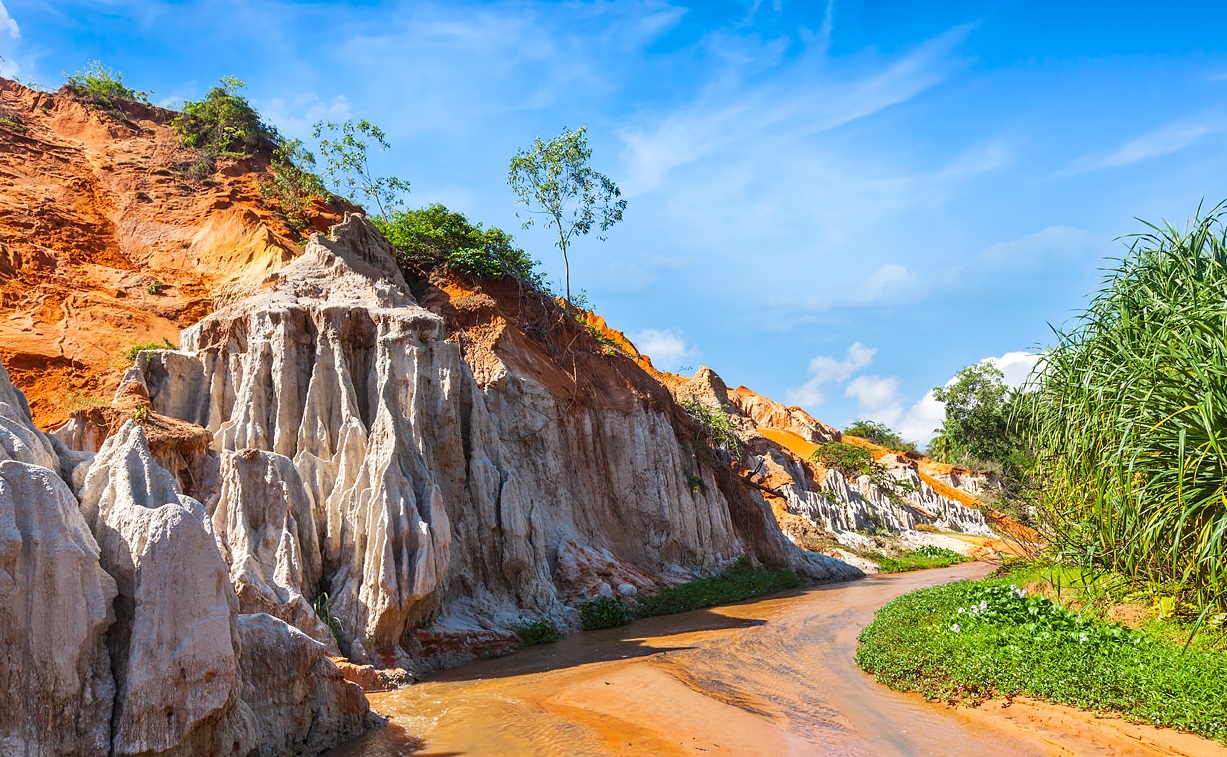
The brown water running through the canyon is made up of red clay, turning the riverbed into a soft surface and one that is quite comfortable to walk through. Tours of the stream usually take about 45 minutes, giving you ample opportunity to saunter through the water at your own pace, admiring the geology and taking some very vivid snaps.
Hon Rom and Mui Ne Bay
Harking back to the days when Mui Ne was a sleepy fishing village, large swaths of Hon Rom act as sort of a time capsule, freezing a small part of Mui Ne in the era before it became one of Vietnam’s best resort towns. Its rugged beach is dotted with a huge mass of fishing boats, continuing the tradition that established Mui Ne before the arrival of 5-star hotels. It’s hard to move for the wild scrub and basket boats that fleck the beach here, but the beauty is raw and it’s hard to find a more natural attraction in Mui Ne than this small peninsula.
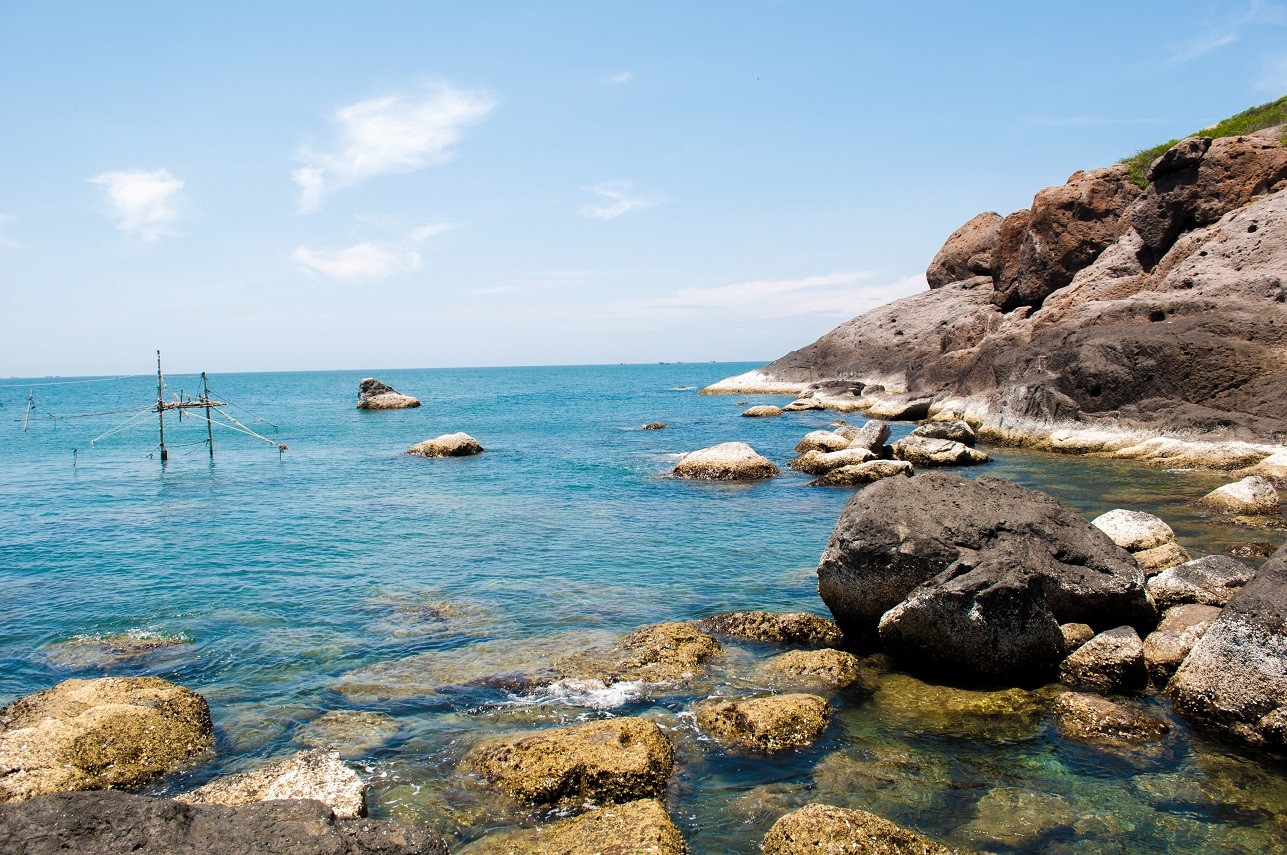
At the similar but more popular site of Mui Ne Bay, colourful fishing boats get an audience of camera shutters clicking, as the picturesque scene that they create in a small, craggy cove is one of the lasting images of Mui Ne for tourists who visit it. The bay is viewed from a cliff above, where tourists can snap it from its best angles, watching the lazy activity on fishing boats that have sadly become largely obsolete because of the vast difference in income that tourism brings overfishing. Still, they hark back to the same placid atmosphere bestowed by Hon Rom, one that was universal in the city until recently.
Architectural Attractions
Given that Mui Ne was a town founded by a collection of relaxed fishermen, it was never going to be one of the top architectural powerhouses of Vietnam, and grander buildings can indeed be found in Hanoi and Ho Chi Minh City. Nevertheless, there is a certain quaint charm to some of the buildings of the town and, like with most of the best things to do in Mui Ne, they have a whimsical touch of the bizarre about them.
Rang Dong Wine Castle
By bizarre, we’re talking about the gigantic Wine Castle, built to look like a traditional European castle but more probably based off a Google image of a Disney-inspired child’s drawing. 200,000 VND ($9 USD) will get you a tour of the castle, giving you a chance to see the inner workings of the large cellars and also a chance to taste 5 wines, all from the Napa Valley in California. In fact, there is not much of a Vietnamese vibe to this European-style castle housing American wines, but the architecture and the scenery around the hill that it finds itself on definitely make it one of the more interesting things to do in Mui Ne.
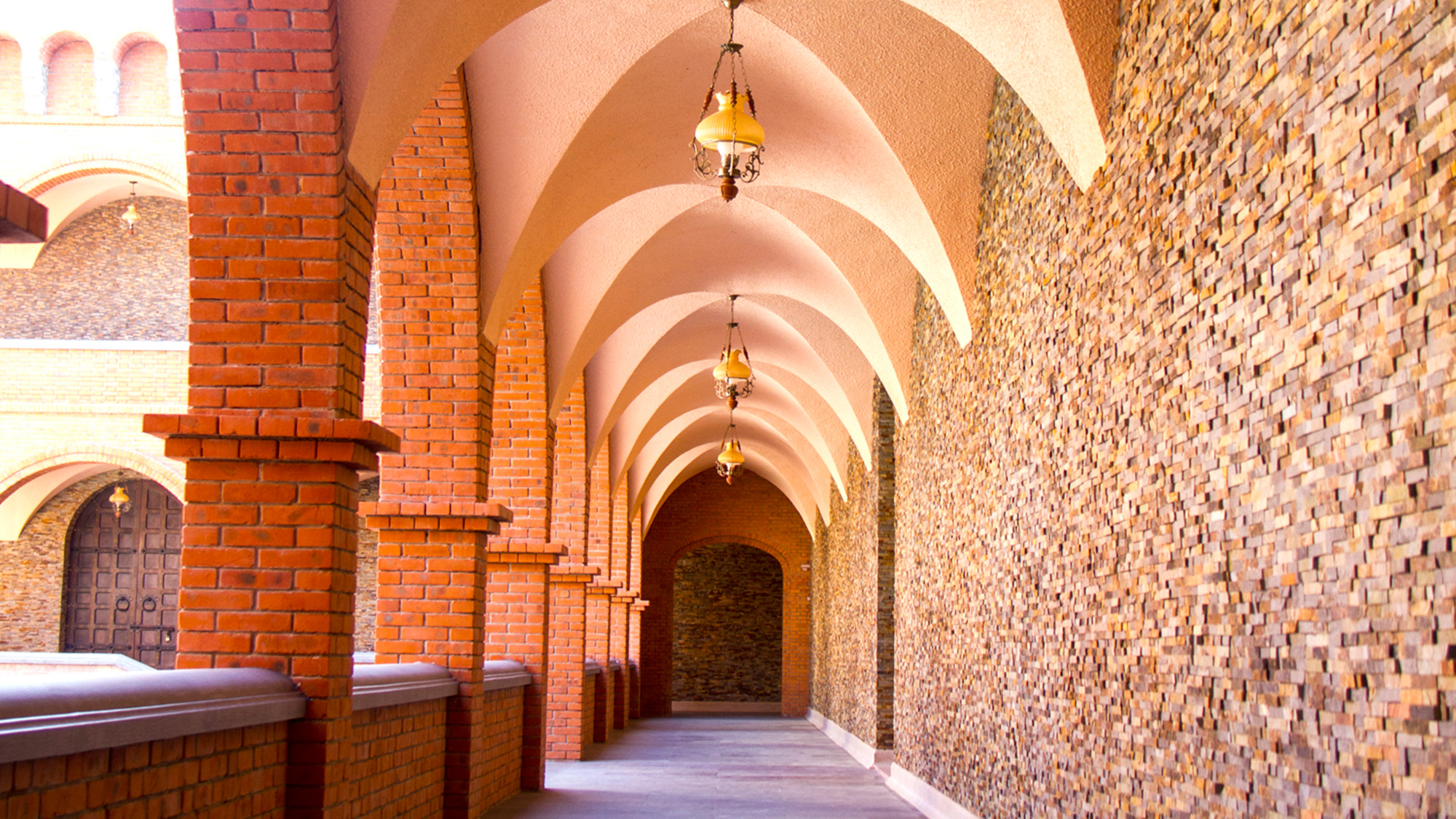
Po Shanu Cham Towers
On the border with Phan Thiet, the city neighbouring Mui Ne to the west, stand the Po Shanu Cham Towers, two stubborn relics of the Champa civilisation who used to occupy large sections of southern Vietnam. The Champa empire was mercilessly destroyed in the early 19th century by Vietnamese emperor, Minh Mang, but their legacy still stands from the 9th century, when Po Shanu were constructed to celebrate Hindu gods. Along with similar towers at My Son Sanctuary (Hoi An) and Po Nagar (Nha Trang), Po Shanu provide an excellent historical highlight of Mui Ne and a reminder that the town was not always so laidback and care-free.
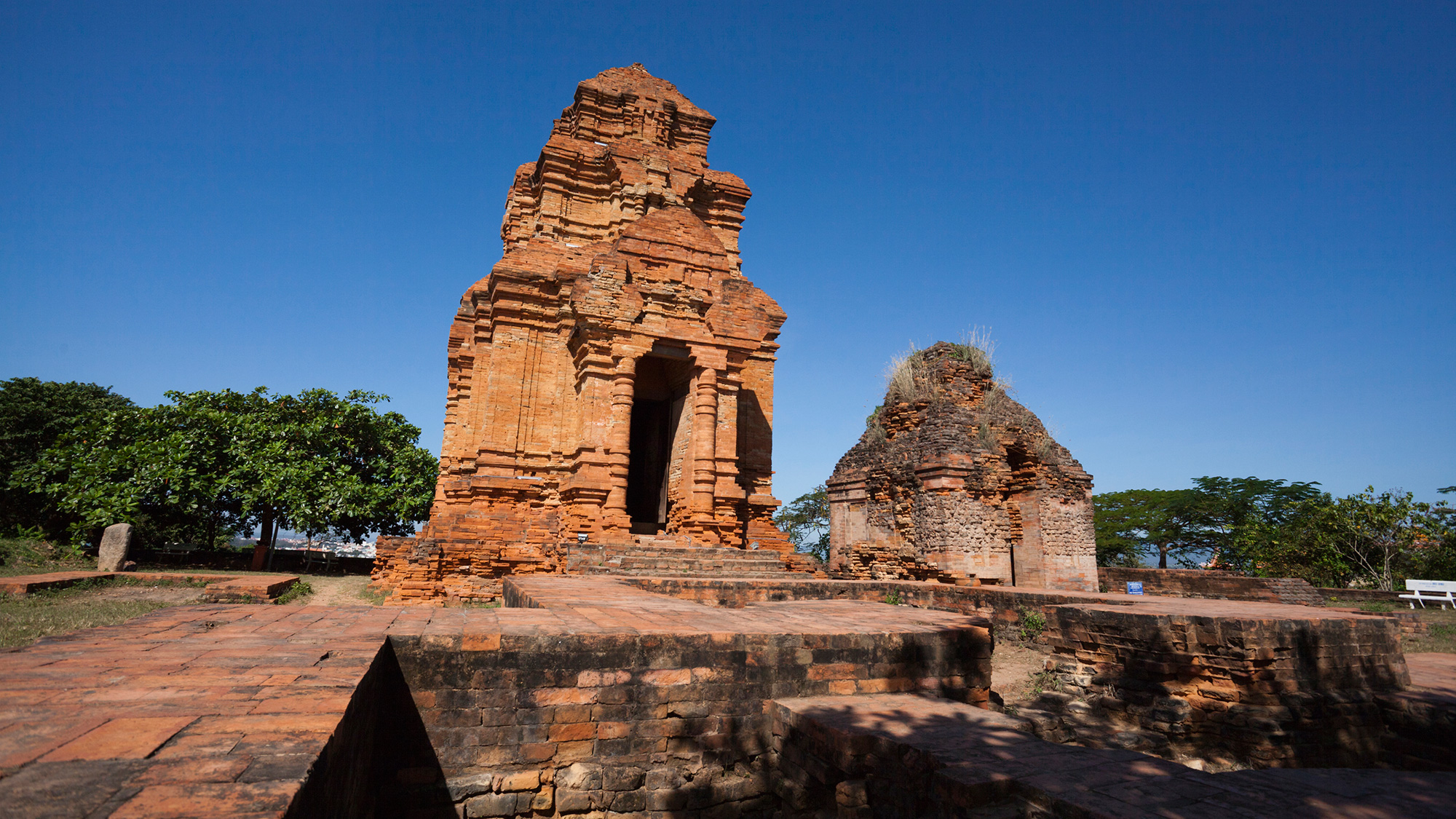
Mui Ne Church
The uniqueness to Mui Ne’s architectural attractions continues with Mui Ne Church, a beautiful church with European roots, built in a very Vietnamese style. Reminiscent of Phat Dien Cathedral in Ninh Binh, this church’s large front is built of several tiers, coloured immaculately in sandstone-orange and featuring some curved, tiled roofs sporting universal emblems of a dragon. Other churches in the area such as Rang Church, are less Asian in their make-up, but are still comprised of the same sandstone colour and spotless presentation.
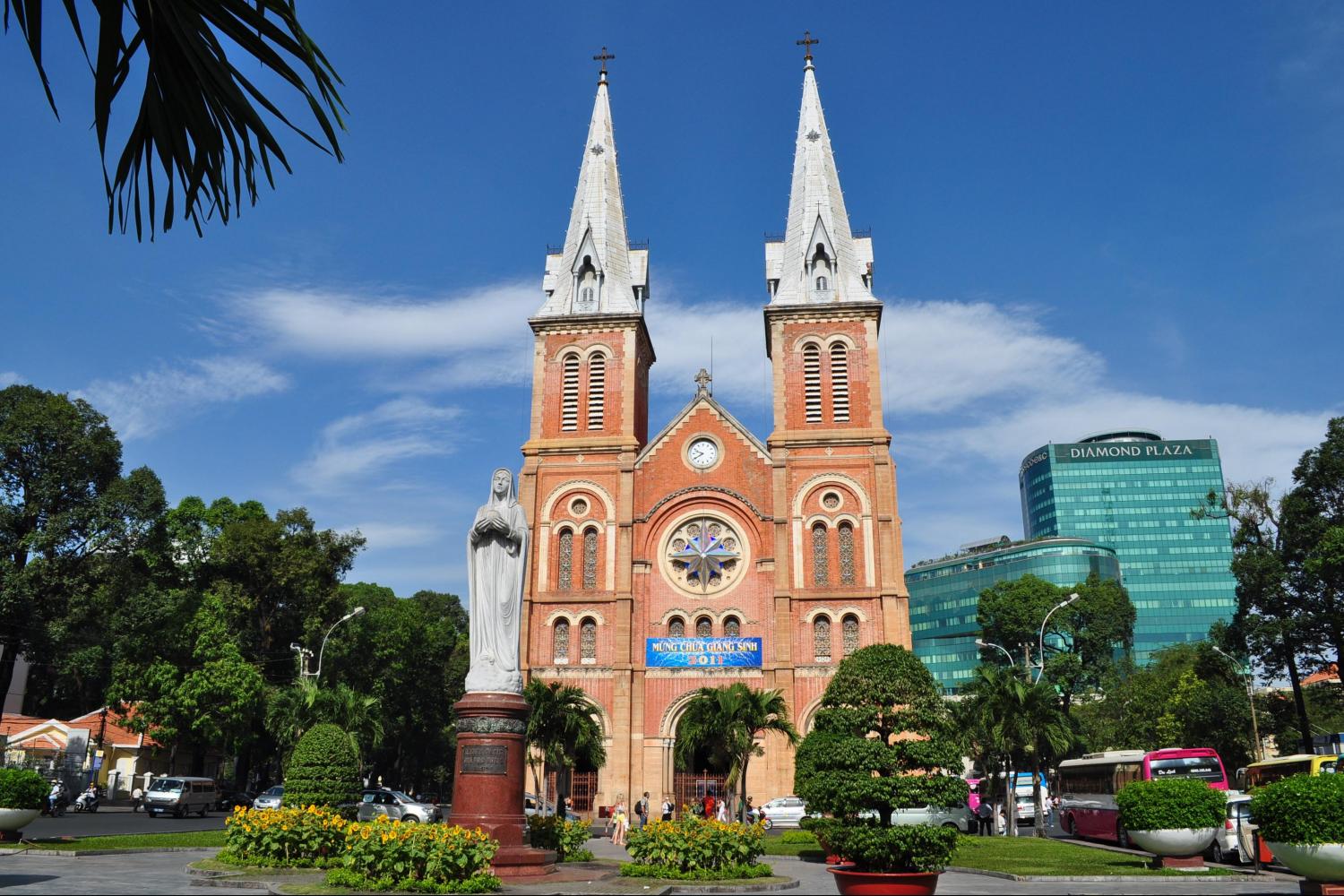
source: incredibleasiajourneys


